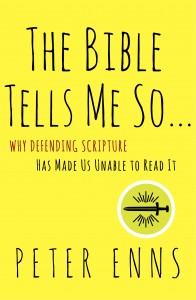I led the sermon discussion last night at Solomon’s Porch. The text was Galatians 3, one of the oddest chapters in the Pauline corpus. Therein, Paul argues for grace over law based on this verse from Genesis:
And I will give to you, and to your offspring after you, the land where you are now an alien, all the land of Canaan, for a perpetual holding; and I will be their God.
The word for “offspring” is actually “seed,” at least in the Septuagint. Paul argues that since this word is in the singular (σπέρμασιν – spermasin) instead of the plural (σπέρματι – spermati), it must mean Christ! (It reminds me of the old saw: The Sunday school teacher asks, “What is gray and furry and climbs trees?” The little boy raises his hand and says, “It sounds like a squirrel, but I’m going to say Jesus!”)
What Paul writes is,
The promises were made to Abraham and to his descendant. It doesn’t say, “and to the descendants,” as if referring to many rather than just one. It says, “and to your descendant,” who is Christ.
It seems that Paul is straying from the traditional interpretation of the Abrahamic covenant. And that’s what we wrestled with for about 40 minutes last night, with no great conclusion.
So it was no great surprise to me that the first 22 verses of Galatians 3 isn’t included in the lectionary, from which many mainline churches choose their Sunday texts each week. The fun part of the chapter (“there is no longer Jew or Greek, slave or free, male or female…”) is in the regular three-year lectionary cycle — specifically, Proper 7, Year C — but you’re can spend your whole life at a Lutheran, Episcopal, or UCC church without ever hearing your preacher struggle to understand Paul’s arguments in Galatians 3: 1-21.
I thought of this when reading Carl Gregg’s interesting post on “picking and choosing” Bible verses, excerpted below. He makes the point that everyone picks and chooses, so why not choose a hermeneutic of love? Fair enough. But, I ask, how about you don’t pick and choose at all? How about you work through the whole Bible, chapter-by-chapter, as a community?
It can be done. We do it every week at Solomon’s Porch. It’s not easy. It’s not always fun. But we are, more than any other church I’ve ever seen, a community shaped by the Bible.
Anyway, here’s what Carl has to say:
We should not be surprised at this “picking and choosing” for at least two reasons. First, the Bible is a sprawling anthology, written and edited over the course of centuries. Furthermore, the biblical authors wrote for many different reasons, and none composed with the hope that their writing might be accepted for publication in a book called the Bible. Instead, both the people of Israel and the early Christians, at different points, collected and edited what some considered the most important of their theological writings, and these collections over time became included in the various forms of the Bible.
Second, we should not be surprised that everyone engages in “picking and choosing” because if you survey what the Bible has to say about, for example, anger, wealth, adultery, disobedient wives and children, marriage, and divorce it becomes clear that the Bible is simultaneously both contradictory and enormously demanding. In other words, it is essentially impossible to obey all that the Bible literally says because some parts of the Bible are mutually exclusive of other parts. Does this mean that we are free to choose willy-nilly which parts of the Bible to follow? To quote the apostle Paul’s repeated refrain from the epistle to the Romans, “By no means!” However, from the perspective of progressive Christianity, Jack Black as Jesus is right when he says, “If you pick and choose, why not choose love?” [Read the rest at “Why Not Choose Love? Picking and Choosing Scripture as a Twenty-first Century Christian”]











